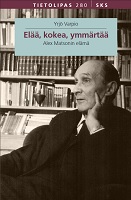Elää, kokea, ymmärtää
Alex Matsonin elämä
Abstract
Alex Matson (1888–1972) is an important Finnish literary critic and essayist, whose literary reviews and collections of essays have made a vital contribution to the development of Finland's postwar literary generation. Born in Finland as the son of a sailor, Matson moved as a young child with his family to Hull in England, where he went to school. In the 1910s, he moved back to Finland, where he at first established himself as painter associated with the expressionist November Group, an important Finnish artistic movement at the time. In the interbellum, he moved from fine arts to literature. In the 1920s and 1930s, he published several novels, but more important was his work as transmitter of international literary ideas to Finland. Together with his first wife, Kersti Bergroth, he edited the literary journal Sininen kirja (""The Blue Book""; 1927–1930), which was inspired by the writings of John Middleton Murry and Katherine Mansfield. Sininen kirja is the most international literary journal in Finnish history to date and introduced Finland to the most significant modernist writers of the first half of the 20th century (Gottfried Benn, Jean Cocteau, Alfred Döblin, T. S. Eliot, Aldous Huxley, James Joyce, D. H. Lawrence, Katherine Mansfield, Paul Valéry, Virginia Woolf).
During the Second World War, Matson worked for the State Communications Agency, which was responsible for disseminating relevant information about Finland to other nations and for informing Finns of relevant developments abroad. It was also tasked with studying the prevailing mood among the population in Finland. In Matson's unpublished wartime diaries, one can see the first symptoms of a shift in Finnish culture away from Germany and towards Anglo-Saxon culture.
From the 1940s onwards, Matson recommended new English and American novels as a part of his work as reader for Finnish publishing houses, and he also translated works by Joyce, Hemingway and Steinbeck. With the help of a network of international literary critics, Matson became acquainted with New Criticism, which he introduced to Finland before it became established among academic researchers. He was often critical of academic literary studies, but his seminal essay works Romaanitaide (""On the Prose Novel""; 1947), John Steinbeck (1948), Kaksi mestaria (""Two Masters"", on Tolstoy and Dostoevsky; 1950) as well as his impressive conversational skills were instrumental in introducing knowledge about the principles of the prose novel to several authors (including Väinö Linna, Lauri Viita, and Hannu Salama), and contributed to their views of literature. Matson emphasized the importance of reading and understanding high-quality literature for the wellbeing of society.
Keywords
literary criticism; translators; Matson Alex; reception; biographical history; migrationDOI
10.21435/tl.280ISBN
9789518586114, 9789518586121, 9789518586138Publisher
Finnish Literature Society / SKSPublication date and place
Helsinki, 2023Series
Tietolipas, 9Classification
Biography: general
History
Biography, Literature and Literary studies
Migration, immigration and emigration
Relating to migrant groups / diaspora communities or peoples


 Download
Download Web Shop
Web Shop